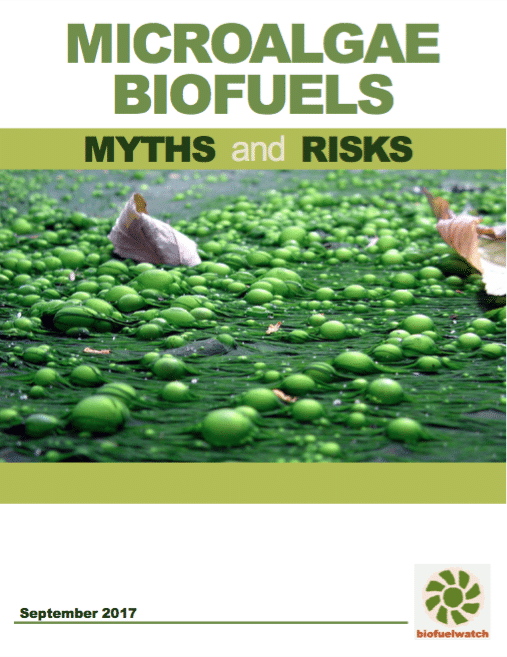- Home
- Food & Agriculture
- Genetic Engineering
- Synbio Algae Report
Synbio Algae Report
On the eve of the 2017 Bio-Based Live Americas conference, Biofuelwatch, and Friends of the Earth co-released a new report Microalgae Biofuels: Myths and Risks and issue brief “Genetically Engineered Algae: “Living cell factories” or looming disaster?
News release
Summary: Microalgae, both diverse and adaptable, are vital to regulating ecosystems and the Earth’s climate. With recent developments in genetic engineering and synthetic biology, researchers are attempting to alter algae’s DNA and use this genetically engineered and potentially invasive algae to manufacture biofuels and industrial chemicals. Viable commercial production of algae biofuels, even after decades of research and massive investment, has not yet been achieved. Meanwhile, companies are turning to low-volume, high-value products derived from GE algae, including ingredients for food and consumer products, nutraceuticals, and animals feeds, to stay in business. These products are largely unregulated and are entering the market unassessed for their health and environmental impacts.
This report examines the environmental, regulatory and economic questions about proposals for genetically engineered algae biofuels. It also examines the investment hype around algae biofuels, in spite of commercial viability, environmental risks, and a lack of oversight.
Key findings of the report include:
- Even after decades and millions of dollars in public and private of investment, production of algae biofuels has failed to become commercially viable.
- Genetically engineering microalgae to produce fuels, chemicals, and other products poses serious threats to the environment and public health: invasive algae outcompeting native species, potential for increased harmful algal blooms, and land use impacts from chemical, energy and water intensive feedstock production.
- Several major companies invested in producing genetically engineered algae are turning to low volume, high-value products to remain economically viable, with some such products already on the market, including ingredients for food and consumer products, all of which are derived from GE algae.
- Government agencies, including Department of Energy (DOE) and U.S. Department of Agriculture (USDA), along with various state and private sources, continue to invest heavily in algae biofuels.
- The continued market hype about GE algae biofuels as sustainable, claims of unrealistic productivity, and historic promises of commercial viability just over the horizon perpetuate the myth of a “miracle fuel” and that unsustainable energy consumption may continue “business as usual.”
Recommendations:
- Investment and resources into more sustainable, less risky and proven solutions to climate and energy concerns, such as efficiency, solar and wind energy, relocalization, expanded public transportation, and regenerative agriculture.
- A precautionary approach to developing genetically engineered algae, which weighs the costs and benefits of GE algae to society and ecosystems as a whole.
- Robust federal regulation, oversight, and assessment which addresses the process of production, contamination risks, and which places the burden of responsibility for ecological contamination on the producer.
- A transparent, democratic process with which to evaluate and appropriately regulate new, emerging and proposed applications of synthetic biology.
- Increased investment in more socially just and less risky solutions to environmental, health and social problems.
For more information: GMOs 2.0 – Synthetic Biology

